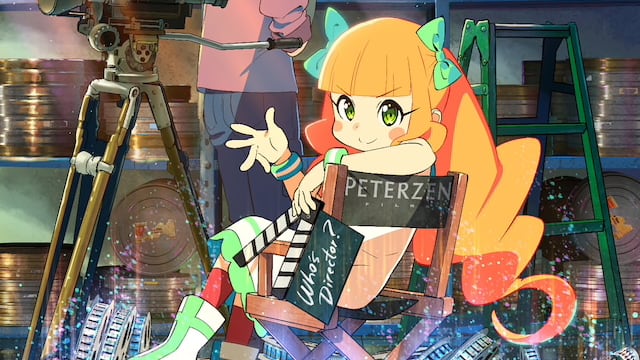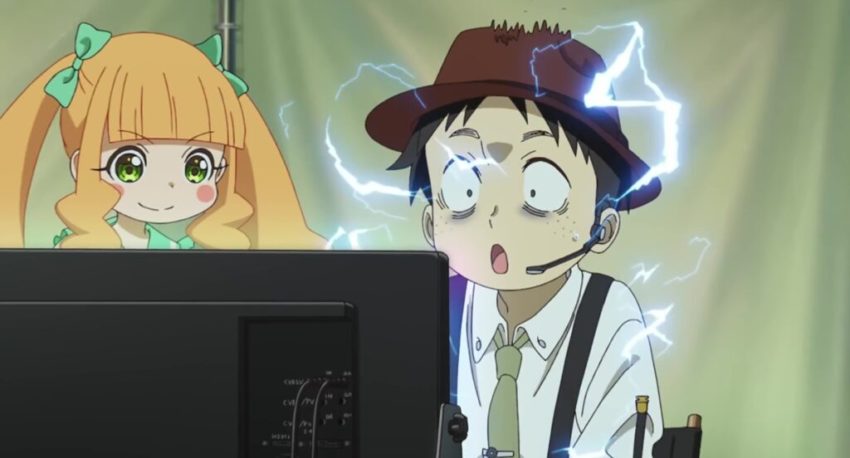
[ad_1]
September 12, 2021
·
0 comments
By Jonathan Clements.

Joelle Davidovich Pomponette, or Pompo for short, is a pint-sized producer, grand-daughter of a studio founder, who simply loves making movies. In the fictitious movie capital of “Nyallywood”, she is known for highly-regarded B-pictures – the anime lovingly recreates posters for works such as Guns Akimbo and Zombizarre, alongside her latest horror-from-the deep, Marine. But like a glamour girl who never gets offered a role in a period drama, Pompo has been typecast as someone who only makes one kind of film… until her assistant Gene stumbles across Meister, a script with real Nyakademy Award-winning potential. It’s Pompo’s own script, but she doesn’t want to direct it. Having seen the way Gene cut together the trailer for Marine, Pompo thinks he might have what it takes to direct it himself…
Pompo the Cinephile began life in 2015 as a throwaway instalment of a late-night animated comedy show, created by Shogo Sugitani. When the original project fell through, Sugitani refused to give up on the charismatic character of Pompo the producer, instead recycling her as the star of her own manga series, running on the online platform pixiv Comic where it garnered an impressive 940,000 views.
Unlike Shirobako, which prides itself on a realistic depiction of the nuts and bolts of making an animated film, Pompo is more interested in creating the impression of working on live-action movies. It approaches film-making with a relentless, infectious optimism, almost as if a bunch of downtrodden, underpaid Japanese animators have fixated on Nyallywood as an idealised dream factory, where true talent wins through, the show-runners (well, most of them) can spot a rookie’s potential in the raw and train them for success, and everybody gets their just desserts. The largest leap of faith required of the audience is believing that a teenage girl can somehow be a seasoned producer, but even this is an enthusiastic perspective on old-time Hollywood nepotism. Pompo is particularly good on the personalities and, for want of a better term, the political economy of movie-making – how films get put together, what it feels like to be at the sharp end on set, and how power-brokers can make or break a project with an idle comment in a meeting.

Pompo captures perfectly the enthusiasm and nervy positivity of a certain type of film industry worker. It takes a village to make a movie, and the creative arts are famously tolerant of eccentricities and peccadillos, as long as a creative is left untrammelled to be the very best at what they do, be it carpentry, lighting or make-up. Pompo is an unapologetic cheerleader for B-movies, cranking out Asylum-level nonsense with scream-queens and scary monsters. But she has a mindset that is vital in producers (and in critics, and indeed on festival juries) – she loves each of her films for what it is. She assesses her films on the basis of how they can be the best type of that film that they could be, and it soon becomes obvious that she has a similar attitude towards people.
The real world may well be packed with cynics and gripers, but it also has its fair share of starry-eyed dreamers, in love with the idea of creating something, and loving it for what it is. Nor are such people unwelcome – grumbling grips might be the guys you need to keep a shoot running past midnight, but producers (and actors) often need to be single-mindedly, delusionally blinkered about Just How Great a production is, otherwise they will never put in the necessary energy. Pompo never loses her enthusiasm, but the film that carries her name in the title is also about the degree to which Gene can make it through the highs and lows of a movie production without becoming brow-beaten and burned out. We see him, through the eyes of his old school chum Alan (a character newly created for the film), as he clambers up the hierarchy from assistant to auteur.

Director Takayuki Hirao couldn’t be a better choice for running this particular show – Scotland Loves Anime veterans may remember him for his 2012 splatter-fest Gyo: Tokyo Fish Attack, in which Japan is overwhelmed by cyborg sharks. He returned in 2013 with the under-rated Little Witches Yoyo and Nene, in which a sorceress from another world is entirely unphased by her transportation to the mundane suburbs of Yokohama. Hirai spent much of the rest of the 2010s working on various media incarnations of the sci-fi hokum God Eater, as well as several below-the-line appearances in the staff of Attack on Titan. Back in charge of a movie of his own, he pulls out all the stops to make an energetic celebration of the joy of creativity, charmingly using the formulae of movie story-telling to tell the story of a movie. Here, a three-act structure takes us from pre-production, to production, to a desperate scramble to fix everything with reshoots. Pompo’s grand climax is not a car chase or a dogfight, but a tense depiction of the editing process, as Gene is forced to snip and snap away at the hard-won scraps of footage in order to fix everything in post-production. In a winning metatextual demonstration of the power of editing, Hirao delivers his own film bang on target with a lean, sleek 90-minute running time, not an ounce of fat on it.
Of course, a movie is not over merely because it has its premiere, and a good producer should already have her eyes on the next project, even as she is sorting out the marketing and the overseas sales, and diddling her actors out of their residuals. Manga creator Sugitani originally claimed that the Pompo story was complete and perfect in a single volume, but was lured back in 2018 for a sequel, in which his producer embarked on another project. In a meta touch, Pompo 2 ran in tandem with a spin-off, Fran the Cinephile, an Entourage-style comedy focussing on a starlet’s troubled path from aspirant to producer. Through Fran’s eyes, we get to see what becomes of Gene after his movie debut gets him some Nyallywood traction, and he is offered a number of other deals, every one of them a pact that will eat up another year of his life. We get to see him taking a pay cheque on the blockbuster Max Storm 2, and biting off more than he can chew with his ambitious arthouse project Love Begets Love, forcing him to reach out to Pompo to fish him out of trouble. She agrees, but only if he returns the favour by helming her next project, Lunch Wagon. But that’s all in Gene’s future for now – the movie Pompo the Cinephile concentrates instead on his first production, as he teams up with the go-getting actress Natalie to be the very best he can be, while Pompo breezily tells him that she believes in him.
Jonathan Clements is the author of Anime: A History. Pompo the Cinephile is screening at Scotland Loves Anime.
[ad_2]





